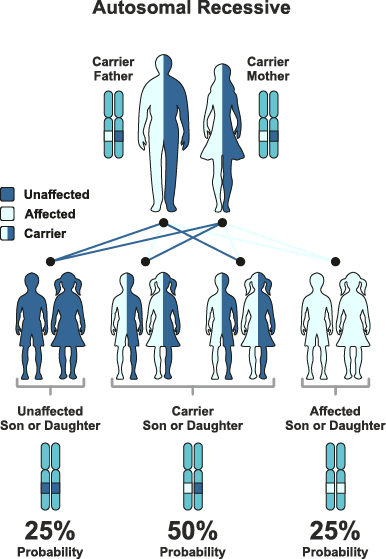PGT-M – preimplantation genetic testing of monogenic diseases
At present, genetic laboratories are able to rule out most inherited diseases in embryos before they are actually transferred to the uterus. If there is a disease with a known genetic background running in the family, we can prevent the newborn baby from having this particular disease.
Hereditary diseases with a known genetic background are divided into recessive inherited diseases and dominant inherited diseases. Each person has two copies of each gene (two alleles on two chromosomes of the same pair). In case of recessive inheritance, in order for a disease to manifest in an individual, it is necessary for both alleles of the gene to carry the disease – the child then inherits one disease-carrying allele from the mother and the other one from the father.
In the case of such diseases, both parents may be healthy as they are only carriers of the genetic disease (i.e. they have one disease gene and one healthy gene concerning this particular disease). However, if the embryo inherits one disease gene from the father and one disease gene from the mother (the statistical risk is 25%), the disease will develop. In our population, the most common diseases with this type of inheritance include cystic fibrosis, spinal muscular atrophy (SMA), phenylketonuria, thalassemia, non-syndromic hearing loss, congenital glaucoma, various metabolic diseases, hypercholesterolemia and many others.
In the case of dominant inherited diseases, one copy of the disease gene is sufficient for the disease to develop. Thus, if one of the parents suffers from the disease, there is a 50% risk that his or her offspring will also develop this disease (either a healthy gene or a disease gene can enter the sex cell). Such diseases include, for example, Huntington’s disease,the BRCA genetic mutations (the risk of breast cancer and other cancers), polycystic kidneys, spinocerebellar ataxia, myotonic dystrophy and many others.
Specific inheritance is observed in diseases whose genes are carried on the sex chromosomes. In the case of X-linked diseases, the disease behaves as recessive in women, while in men, since they have only a single X chromosome, the disease manifests itself as dominant – all that it takes is one disease gene. Such diseases include hemophilia A, Duchenne muscular dystrophy or fragile X syndrome. There are also dominant genetic diseases linked to the X chromosome, but they are very rare. Since the Y chromosome contains very few genes, inherited diseases linked to the Y chromosome are very rare as well.
If it is known that some of these inherited diseases run in the family and the couple wants to prevent that a child develops this disease as well, it is possible to deliberately search for the disease in the embryo. In addition to ruling out of these diseases, embryo aneuploidies are being tested as well to maximize the chances for a healthy pregnancy.
